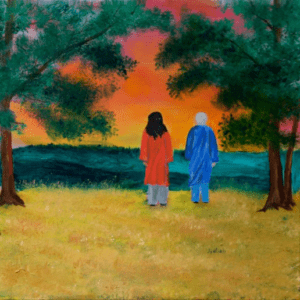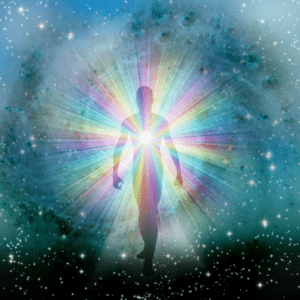To those who have many questions about having a Guru
This is a comprehensive post. It answers almost every question of having a Guru on the spiritual path.
It is based on the wisdom of Paramhansa Yogananda – a self-realized yogi. And the experience of his direct disciple Swami Kriyananda.
Swami Kriyananda dedicated his life to follow his guru’s guidance on the path of Kriya Yoga.
Whether you’re searching for a Spiritual Master or you’re simply curious about the topic, you’ll find this post full of insights, wisdom and truth.
Let’s dive in!
Table of Contents
Swami Kriyananda (1926 - 2013)

A Lifelong Disciple of Paramhansa Yogananda
Swami Kriyananda was born James Donald Walters in May 1926 in Teleajen, Romania.
During his college years, he started the search for truth.
In the late 1940s, he came across Paramhansa Yogananda’s most influential book Autobiography of a Yogi. After reading the book he hopped on a train and travelled all the way to California to meet Yogananda.
“I want to be your disciple” were the first words of Swami Kriyananda to Paramhansa Yogananda at his Mount Washington ashram in Los Angeles, California. Yogananda accepted him as his disciple.
Your work, Yogananda told Kriyananda is writing, editing and lecturing. There Kriyananda worked closely with Yogananda.
Many times the Guru told Kriyananda, “You have great work to do”. It was not a praise but a serious commission to help bring Yogananda’s teachings into the world.
Over 60 years of his discipleship, Swami Kriyananda established several communities, as well as teaching centres and meditation groups all around the world. He also wrote many books, pieces of music and lectured worldwide.
Introduction
Excerpts are taken from The Essence of Self-Realization, words of Paramhansa Yogananda as quoted by Kriyananda.
In studying the science of yoga, it is easy to concentrate only on the techniques of the path and become deluded by the thought that we can find God by our efforts alone.
Through discipleship we learn to achieve that balance of self-effort and divine grace that is essential to spiritual progress.
For, ideally, the techniques of yoga should help us cooperate with the flow of grace in our lives. It is only through grace, drawn from the guru by the sincere disciple, that real inner change occurs.
We hope you will come to know how to draw the grace of the guru into your life, and how to receive it more fully until you become one with God.
Accepting a guru isn’t the assumption of a burden! It isn’t a menace to a person’s free will and happiness! It is the greatest blessing that you, or anyone, can possibly have in this world.
Incarnations of good karma are required to attract the help of a true guru.
People who are still locked up in the cage of ego often view the prospect of having a guru as a threat to their personal freedom. They don’t realize that freedom is exactly what they don’t have at present!
Paramhansa Yogananda
God sends the seeker indirect guidance at first, through books and lesser teachers. Only when the desire for Him is very strong does He send help in the form of a Self-realized guru.
It is no favor to the guru if the student accepts him. Rather, the student must have prayed very hard, in this lifetime and in former lives, to have earned so great a blessing.
It isn’t that you need to go out looking for the guru. The Lord will send him to you, or else draw you to him, when you are spiritually ready.
The Guru’s role is to open the door of the cage.
If a disciple, finding himself still attached to limitation, cries, “Leave me alone; I like my nice little nest of pleasures and desires!” the guru won’t insist. He will say, simply, “I came because you called me; otherwise I would not have troubled. It wasn’t my need that brought me. It was your need. So, until you call me again, I will wait.”
Understanding the need for a guru
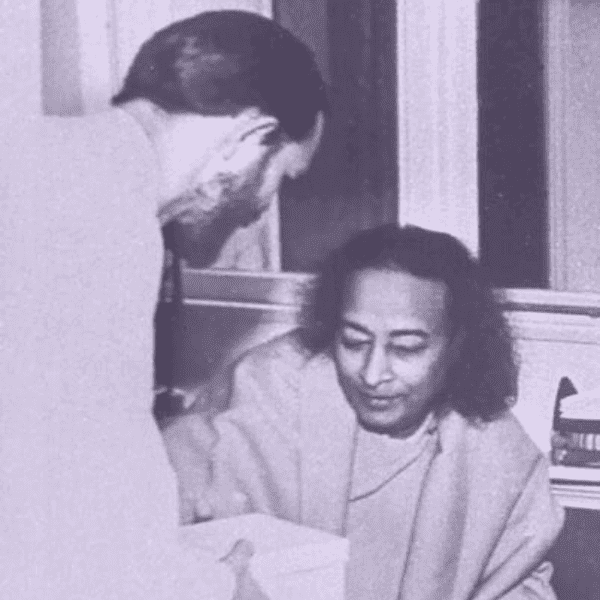
Does everybody need a guru?
Taken from the Talks by Swami Kriyananda
That depends on what you’re looking for.
The plain fact is that there aren’t very many people who are worthy to have a guru.
You don’t have a guru merely by coming onto the spiritual path. It isn’t that easy. You’ve got to win the right to have a guru, just as you’ve got to win the right to study with a great artist. He’s not going to waste his time with kindergarten children because he knows it’s a waste of energy.
We are living in an age where the thought of discipleship is not pleasing to most people.
It was my own tendency as a young man to be an intellectual rebel. When it came to religion I didn’t think that anybody could teach me anything, because, first of all, I assumed that nobody knew anything.
Secondly, I thought that finding truth was something that demanded such integrity on one’s own part that to take answers from anyone else would not be staying true to oneself.
Finally, I reached the point where I saw that all my efforts to improve myself weren’t getting me anywhere. I would be working on one side of my nature trying to improve that, only to find the other side was beginning to deteriorate for lack of sufficient energy.
I recognized also how ignorant I was, and how often things that looked good to me turned out for some strange reason not to work out at all. Though I hadn’t even accepted that there was a God, I was desperate to find truth.
Another point is that sometimes in meditation you can feel a touch of the divine power which is overwhelming. It’s so immense!
It’s so inconceivably great that when you are in touch with that power aspect of God, you feel as if you could be snuffed out and it wouldn’t even be noticed. It isn’t true, but you feel that this power is so immense that nothing you are could possibly signify anything in comparison. It’s a state that the ego isn’t readily prepared to accept. So it is that we need to grow gradually into this expansion of awareness.
We need to realize that the Divine, out of love for us, sends us the guru to help us.
God, through the guru, steps down His consciousness to the level where we can actually relate to and commune with Him.
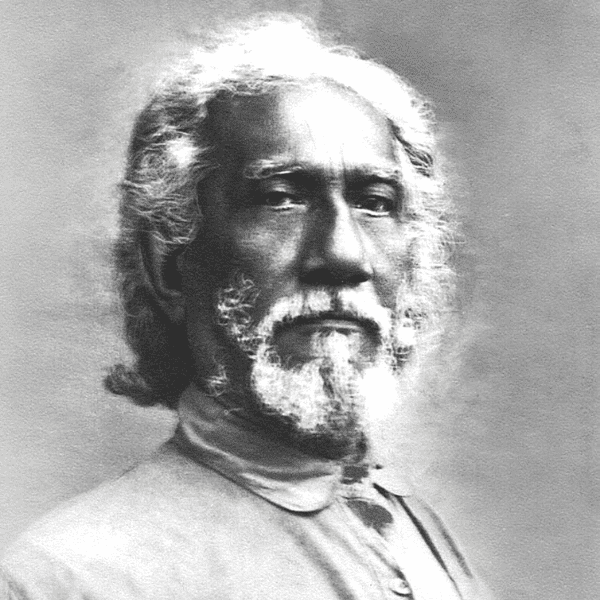
In his book, The Holy Science, Sri Yukteswar explains that the first thing one needs to develop in order to be able to draw the blessings of a real guru is the natural love of the heart. He said it’s not possible to place one foot in front of the other on the spiritual path without this natural love of the heart being unfolded. It’s only when that love does unfold that you become fit to follow one who is able to guide you on the pathway to the Infinite.
When we develop this natural love, we reach the point where we are fit to keep the company of a God-realized guru. At that time, is it necessary to have a guru? Well, is it necessary to have somebody who really can help you to paint well? Probably.
But painting, at least, is something you can see physically and work on if you have a little native talent. It’s a lot more difficult when we come to the level of spiritual training which is so subtle that we can’t often see the changes we’re working on.
Spiritual changes are usually so slow that you can’t see whether you’re going in the right direction until several years have passed.
The years do pass, and they implant themselves on our features and on our consciousness. It may be after many years that you suddenly wake up and say, “Oh, I was wrong in this way.” How often have I heard that story!
It’s so much wiser to have somebody who has been on the path, who’s followed it to the end, and who can tell you the right way to go.
Is it still necessary to have a guru?
Remember the purpose of the guru is to make you your own guru. He’s only there to help and guide you to the point where you can take over on your own. He isn’t there to continue to keep you as a disciple. He’s there to make you as great or even greater than he.
There is no jealousy in God. A guru is trying to make you strong enough, wise enough, to be able to tread a straight path yourself, without any further help on his part.
Sometimes a disciple advances beyond the guru, but still he has that reverence for the guru, knowing that this was the channel through which God came to him. So it is that even those souls like Yogananda who are born already enlightened still play out the guru-disciple relationship to show the right example for other people.
But other than such rare cases, I can only say this: No, you don’t need a guru, if you don’t want God. But if you really want God and you want to work at it, then you do need a guru.
How do you find a guru?
I heard a true story about a man who went up into the mountains to meditate.
One day, after many years of deep meditation, he was out for a walk. When he came back to his cottage he found a man sitting in the lotus pose. The man said to him, “I have come to help you.”
They say that when the disciple is ready, the guru appears. So we find the guru by developing our own love and by seeking God whole-heartedly. But we must remember that God is the guru – no human being can be a guru.
God is the guru, and he acts through the agency of an enlightened soul. But a true guru will never take the credit to himself for being a guru.
Yogananda never accepted that he was the guru. He always said, “God is the guru.”
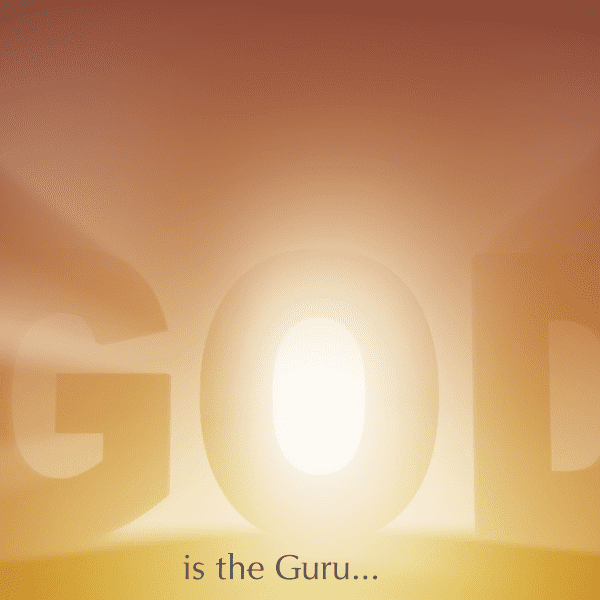
Once at a luncheon at Hollywood Church after the service, someone said to him, “I understand Dr. Lewis was your first disciple in America.” Yogananda replied a little sternly, “That’s what they say.” She was surprised at that response. Then he explained, “I never call them my disciples. They’re disciples of God.”
The true guru will always give the credit where it really belongs – to God. In fact, he has no self to take credit for. He’s only conscious of being an instrument for God.
So if you want to find the guru, and have a true relationship with him, remember it should be a relationship first in God. Don’t expect the intense personal relationship that people tend to get into with other human beings. A guru won’t accept that.
The Guru Works Through Magnetism

The influence of the guru is like that of a magnet. When you have a bar of steel that hasn’t been magnetized, its molecules are turned randomly, cancelling each other out.
When you place that bar of steel next to a magnet, the influence of the magnet gradually aligns all those molecules in a north-south direction. Thus, unmagnetized bar of steel develops its own magnetism. It doesn’t take magnetism from the original magnet, it merely is influenced to align its own molecules.
We have in our subconsciousness all kinds of desires and tendencies from many, many incarnations. These desires are lodged, like molecules, as vortices of energy in the spine.
When we think of all the billions of desires that we may have, we have to consider, “How can we ever fulfill all of them?” It’s like trying to turn every little one of those billions of molecules in a bar of steel to a north-south direction, one by one. You turn a few, and by the time you’ve gotten up to the next group, the first ones are starting to turn their own way again.
Like a magnet, the guru is trying to align the vortices of energy in our spine. He’s not trying to impose his consciousness on you, he’s trying to help you develop your own inner powers so you can transmute all those energies toward the brain, all in a north-south direction.
It isn’t only he who does it; you have to do it for yourself. Those who think, “I’m a disciple of a guru now. He’ll do it all for me,” are mistaken.
In every ashram you’ll find that those disciples who really get somewhere are those who do the work themselves. They take the guidance from the guru to know what to do, but they do the work themselves.
The guru helps us by giving us extra strength, by reaching down and pulling us up, but still we have to do the hard job of climbing that mountain to reach the heights.
It would help your meditations to feel that your guru is sitting inside your body, that it is him doing the practices through you. Mentally ask your guru, “How should I be doing this? Show me.” If you ask questions inwardly with attunement, you’ll find that the answers will be forthcoming.
The way to relate to the guru is always inwardly, not outwardly.
It’s always by going into your spine and trying to bring the energy up. That’s what makes Kriya Yoga such a wonderful science. It helps us to interiorize and raise the energy in the spine, and to magnetize the spine. What happens in this case is really quite literal. It’s a literal fact that each little desire or tendency we’ve ever had has formed a little vortex. All that energy within you is committed to many other things.
The guru’s influence is that power within us that will help to release and lift the energy within.
We’ve also got to make the effort ourselves by Kriya Yoga, by devotion, by other kinds of yoga that raise the energy and direct it upward toward the spiritual eye.
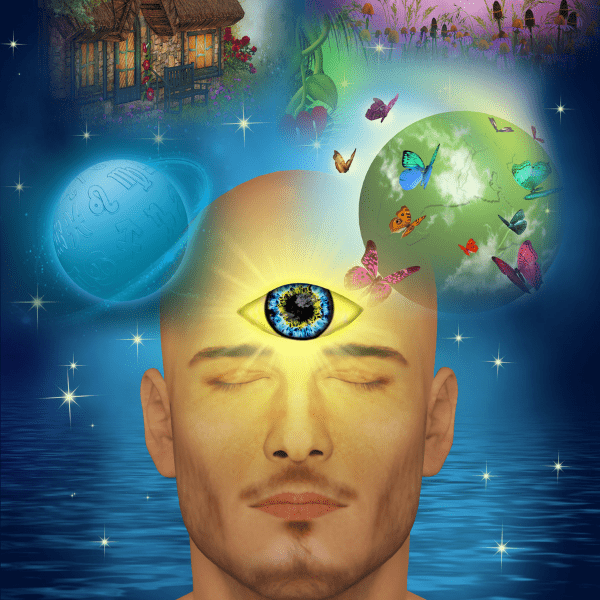
Until we achieve enlightenment, the energy of the ego is trapped at the medulla oblongata.
A master has his being centered at the spiritual eye, and everything he does radiates outward from this point. The more we learn to bring all those energies upward in the spine and offer them to the point between the eyebrows, the more we will grow spiritually. The guru’s only purpose is to help you do that.
Must the Guru Be Present Physically?
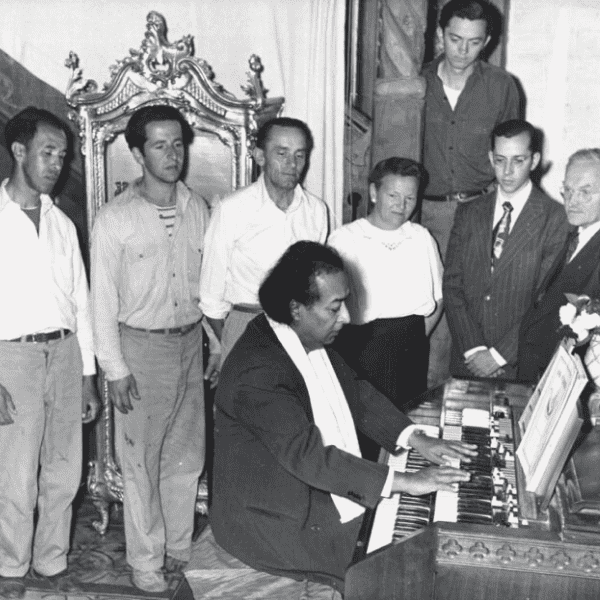
Does the guru have to be with you physically?
No, he doesn’t have to be, because it’s an inner relationship.
I have seen in ashrams those who were only relating outwardly to the guru for years, and never getting very far spiritually. But the really serious disciples were those who took it within, who didn’t feel the need to be with the guru outwardly, but sought inner attunement. The guru’s influence, a spiritual radiation to the disciple, is what matters.
Yogananda came into a body for only a few years, but his power is something that will live far longer. It’s his divine mission to help people. That’s why so many of his disciples who never had a chance to meet him in the flesh feel his presence so strongly. This is what allows someone like Yogananda to be a world saviour.
It’s also good to get guidance from successive lines of those who are in tune with the guru and understand that it is his power that flows through them.
The guru will transmit his power through those who are in tune with him and can give his diksha, the physical touch of his blessing.
He doesn’t have to be living in his physical body because he has many other bodies to work through. But, again, the true goal is for you to become in tune with him inwardly, and to feel that guidance within your own self.
I’ve been speaking of Yogananda particularly, but of course, he’s not the only messenger that God has sent.
You can recognize true saints by the signs that make them masters: the presence of compassion, calmness, wisdom, joy under all circumstances, devotion to God, selflessness – to mention but a few.
Do true masters try to draw people to themselves, or to God?
If they’re trying to draw people to God, then you are in the right hands. If they are trying to draw people to themselves, they’ll weaken you rather than strengthen you.
A disciple once asked Yogananda, “Should I think of you or of Divine Mother?” Master said, “Think of Divine Mother.” He didn’t want people thinking of him as a person. He wanted them to understand always and without fail that it was Divine Mother, it was God, in other words, who was working through him and was his only authority for teaching anybody.
The recognition of the guru must never be personal, but always impersonal, always grand, always vast.
When thinking of a great master, whoever it might be, always think that you are seeing a window through which God is manifesting.
Recognizing Your Own Path
How can you recognize your own guru? – by the divine power that keeps growing within you. It isn’t always easy to know. But if you follow one true path, as you grow spiritually, the time will come when you will know. Either you’ll know that this is the right one, or you’ll be led to the right one.
There is no jealousy in the masters. They are only here to guide us along the path toward our own enlightenment. Many times Master himself would tell somebody that he wasn’t their guru and would send them to someone else.

We have a divine potential within us – we are the perfect soul. So it is part of the Divine Law not only to feed this human being with little inspirations, but also to show us that which we can become. That is the goal of the guru.
The guru is that human being who has attained Infinite consciousness and is able to express in his own total being, his own expanded awareness, all those things that are so far above what we know in our egoic human state.
The guru’s goal is not merely to stand there like a lighthouse and show us what he has become. It is to send down a ray of the divine energy to our human level to lift us up, to perfect us.
There may be other saints who have attained perfection, but we need only to go deep in one relationship.
The deepest relationship possible for man is the one with that messenger that God has sent to the disciple. It is through this relationship with one saint, one master, that we are able to go much deeper than we can through the general blessings of many different saints.
When God sees the devotee striving, first of all he sends him different things that might help him, books, teachings, and so on. When the devotee really becomes sincere, then God draws him to a true guru. It isn’t enough to be with him physically – there has to be a deep spiritual bond formed inwardly.
The guru’s mission is (you might say he hasn’t any choice in the matter because God sends him for this purpose) the salvation of the particular souls sent to him. For us there is no greater blessing possible in this realm of delusion.
Is it necessary to have a guru to advance spiritually?
I don’t really feel the need for one, and I have difficulty with the thought of devotion to a guru.
You need a guru if you want to find God.
Understand what the guru really is, for it is definitely a law of the spiritual path that to find God – indeed, to get very far at all on the spiritual path – one needs a guru.
A true guru is not a man, merely, but an egoless channel for the Divine. His human body and personality are the most superficial things about him. To see him as he really is is to see a blazing light shining through the narrow “window” of his humanity.
You say you have difficulty with the thought of devotion to a guru, but devotion to the guru as a man is not really what is asked of the devotee. (Though if one is thirsty, I should think a cup of water would not be scorned with the excuse that one is looking for a lake.)
My guru, Paramhansa Yogananda, himself said that it is God alone who is the true Guru, acting through the agency of souls that are awake in Him.
To seek God, on the other hand, without at least wanting Him would be self-contradictory. To want Him is to feel devotion to Him. To feel devotion to Him is to love Him in all His manifestations, ignorant as well as wise. Inevitably, then, the true devotee feels special love for those great souls who manifest Him most purely.
What one should look to is God’s impersonal presence manifested in the guru, and not merely to the guru himself as a human being. Master himself taught us this kind of devotion and always discouraged too personal an affection for him.
What is the difference between a spiritual teacher and a guru?
Many people are willing to accept a teacher, but the guru concept as an embodiment of God, as a perfect being, is a problem for them.
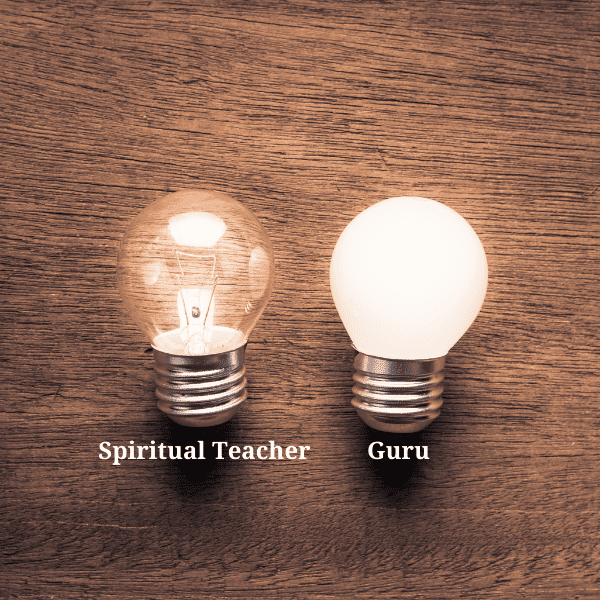
I would say that they are quite different.
There are a lot of gurus around that are not true gurus. To be a true guru, a person has to be already united with God. He has to know the consciousness of the Infinite.
It’s like the difference between going to St. Francis of Assisi for instruction in the spiritual life, and going to a novice leader who hasn’t any kind of realization himself.
Jesus called it, “The blind leading the blind.” They will both fall into a ditch. That doesn’t mean that spiritual teachers are bad, but they have to recognize their limitations. They have to see that they don’t have all the answers. They have to be honest about what they really are and aren’t, at least to the extent that they are capable of seeing themselves.
A teacher is one who has some experience, who is capable of guiding you to a certain point and is perhaps capable of transmitting some spiritual power, but he would not be a guru.
Therefore people who want to go higher need to be guided by a soul who has achieved full realization.
Compilation of excerpts from “The Essence of Self-Realization” talks of Paramhansa Yogananda narrated by Swami Kriyananda and “A Handbook on Discipleship” by Swami Kriyananda

